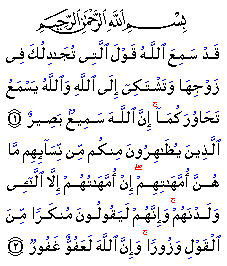God Responds, Clear and Succinct, Citizenship
Issue 487 » July 25, 2008 - Rajab 21, 1429
Living The Quran
Al-Mujadila (She Who Pleaded)
Chapter 58: Verses 1-2
 God Hears and Responds
God Hears and Responds
"God has heard the words of she who disputes with you regarding her
husband and made her complaint to God. God hears your conversation.
Verily God is All-Hearing, All-Seeing. Those of you who shun their
wives by zihar - they are not their mothers. Their mothers are only
those women who gave birth to them. Indeed they utter words that are
unjust and false; but God is Absolving of Sins, All-Forgiving."
It may have been anger that made Aws ibn Samit reject his wife Khawla bint Thalaba with the vulgar expression, "To me, you are like the backside of my mother." Whatever the reason, after so many years of marriage, these words reduced Khawla to the status of his mother's behind (completely devoid of sensual sensation). Moreover, according to Arab custom, there was no way to revoke the declaration of zihar. Henceforth, it was prohibited for Aws to touch Khawla, yet she was not free of the marital bond. Sympathetic family and friends had no power to override such norms and customs. Khawla's only chance was to appeal to a power higher than social custom and patriarchal authority. And so, Khawla complained to God.
Complaining to God is not difficult; the challenge is eliciting a satisfactory response. In what Marshall Hodgson termed the "Irano-Semitic" tradition, the expected response from God entailed not only spiritual comforting but also social transformation. At the individual level, God could send a sign: a kind stranger with food and comforting words, the sun breaking free of the rain clouds, a heavenly vision appearing in a dream. Transforming society, on the other hand, required a different kind of intervention. It is for this purpose that God sent prophets with authority to speak on His behalf, empowered to overturn the existing social order.
When Khawla first went to the Arabian prophet to complain of the injustice done to her, she was disapointed. Muhammad indicated that existing customs remained normative unless God revealed a new ruling, and the Prophet had received no revelation about this issue. Khawla did not give up hope, for she knew that this custom was unjust; she continued to complain to God, and waited near His Messenger, expecting him to receive a revelation. With the above revelation God confirmed Khawla's conviction that what had been done to her was unjust and was to be prohibited by law.
Source:
"The Story of the Qur'an: Its History and Place in Muslim Life" - Ingrid Mattson, pp. 1-2
Understanding The Prophet's Life
Clear and Succinct
When we talk during our visits, we should say only what befits the situation and be brief. We shouldn't prolong our speech, our talk should be clear, concise and to the point, we should not talk and talk and talk. Al-Bukhari reported that Anas said: "The Prophet's, peace be upon him, speech was clear and succinct, neither too long not too short, and he disliked chattering and ranting." Similarly Al-Bukhari and Muslim narrated a hadith in which Aisha said: "The Prophet spoke [so few words] that you could count his words."
Source:
"Islamic Manners" - Abdul Fattah Abu Ghudda, p. 51
Blindspot!
The Meaning of Citizenship
The conventional definition of citizenship is concerned with the act of voting and taking a vow to uphold the constitution and laws of a country. This is narrow and limiting. Too many organizations that are committed to sustaining democracy in the world and at home have this constrained view of citizenship. Citizenship is not about voting, or even about having a vote.
The idea of what it means to be a citizen is too important and needs to be taken back to its more profound value. Citizenship is a state of being. It is a choice for activism and care. A citizen is one who is willing to do the following:
- Hold oneself accountable for the well-being of the larger collective of which we are a part.
- Choose to own and exercise power rather than defer or delegate it to others.
- Enter into a collective possibility that gives hospitable and restorative community its own sense of being.
- Acknowledge that community grows out of the possibility of citizens. Community is built not by specialized expertise, or great leadership, or improved services; it is built by great citizens.
- Attend to the gifts and capacities of all others, and act to bring the gifts of those on the margin into the centre.
Source:
"Community: The Structure of Belonging" - Peter Block, pp. 64-65